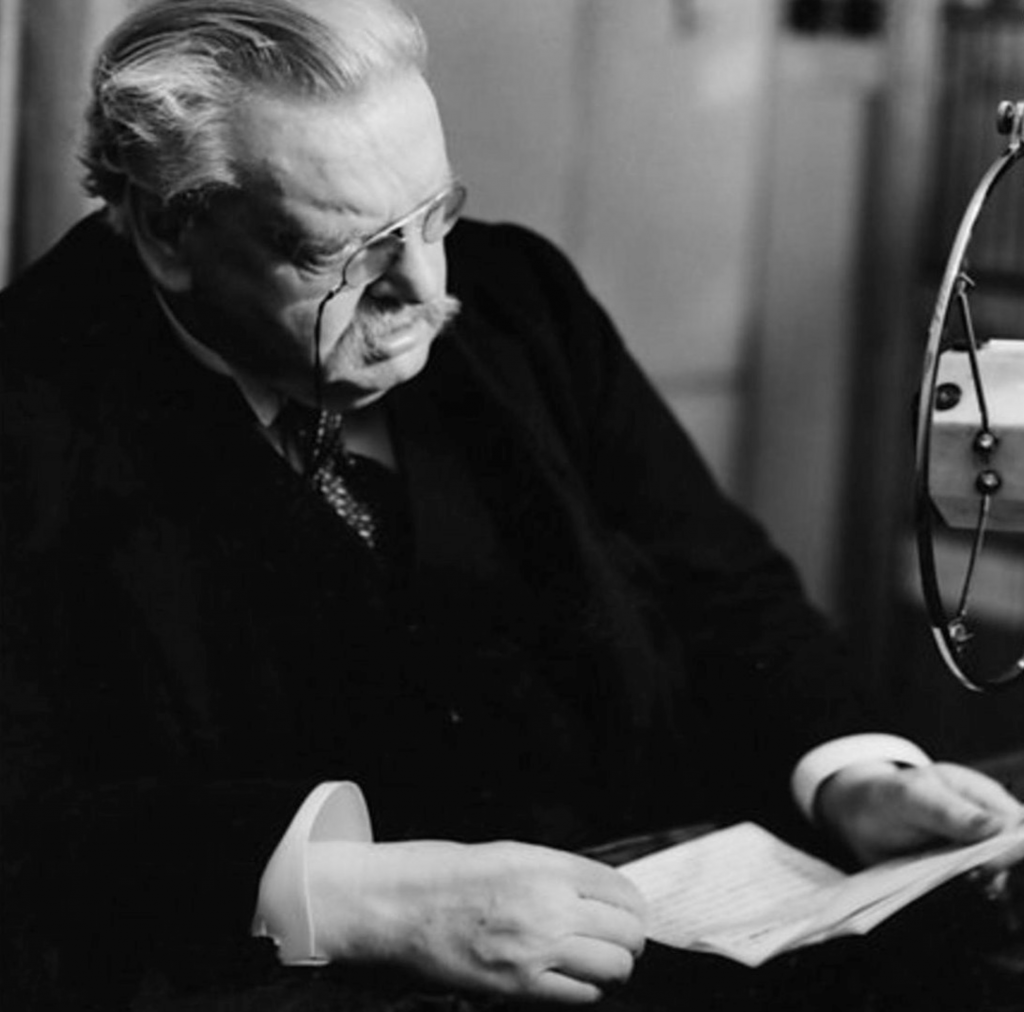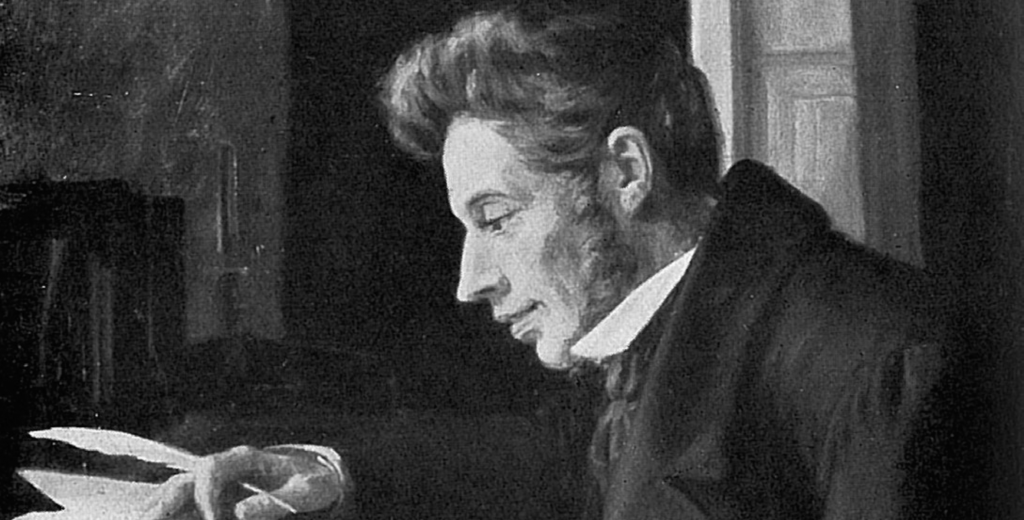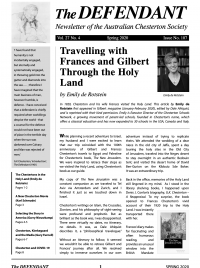Chesterton and the Danish philosopher, Soren Kierkegaard, had apparently different views of the benefits of journalism, but as Gary Furnell, secretary/treasurer of the Australian Chesterton Society, reveals, their outlook was substantially similar.
Chesterton enjoyed being a journalist because he liked polemics and debate. Kierkegaard also liked polemics and debate but he deplored journalism.
Kierkegaard was born in Denmark in 1813 and died in 1855, nineteen years before Chesterton’s birth. Chesterton was probably unaware of him. It wasn’t until 1939 that Kierkegaard’s books were translated into English and published. By then, Chesterton was dead.
Kierkegaard, primarily a writer, was also a lay-churchman, preaching occasional, thoughtful sermons in the Danish Lutheran Church. He grew increasingly and publicly critical of the status and role of the state-sanctioned Church. In fact, he said the goal of his writing was to smuggle Christianity back into Christendom. He thought the Danish church “had exchanged the strong whiskey of the gospel for lemonade”. He wanted people to get a burning mouthful of the gospel’s strong whiskey. The press was among those who stood in the way of his project.
As Kierkegaard wrote:
“The lowest depth to which people can sink before God is defined by the word “Journalist”. If I were a father and had a daughter who was seduced, I should not despair over her; I would hope for her salvation. But if I had a son who became a journalist and continued to be one for five years, I would give him up.”

This sounds like angry prejudice. It may not be. So why was Kierkegaard so perturbed by journalists and their newspapers? He once expressed umbrage at an article about him in a Danish scandal-sheet, The Corsair, and thereafter he was lampooned for several years as an amiable lunatic, resulting in his being mocked in Copenhagen’s streets. Kierkegaard grieved that the newspaper’s venom isolated him from the common people whose company he used to enjoy.
But well before this nasty period, he was deeply alarmed by the role of the press in Danish society because it both distracted humanity and distorted truth.
He thought the press distracted people from a necessary inwardness by focusing their attention exclusively on outwardness; spiritual matters were neglected while external matters were promoted as overwhelmingly important.
Kierkegaard defined worldliness as treating relative values as if they were absolute, and absolute values as if they were relative. Generally speaking, this is what newspapers – and the broader media – are about; what they regard as significant and newsworthy are often matters that are ephemeral, even trifling, while eternal, spiritual matters are routinely neglected.
Silence in the midst of noise
Kierkegaard wished the world was given one gift: silence, so individuals could begin the process of encountering themselves. He disliked the distracting “noise” created by the press.
Kierkegaard understood, too, that what the press presented was mostly bad news, and since the everyday goodness of God is intended to draw us to Him, the persistent presentation of bad news subverted the idea of pervasive and eternal Goodness. That is, it presented a darkened picture of reality that distorted people’s vision of reality.
Further, Kierkegaard thought that the press created an abstraction, the public, and used this abstraction to level opinion to acceptable norms, while sowing confusion. The public could hold the most contradictory positions over the course of a few days simply because it was an abstraction. For example, news-feeds might proclaim “Public outrage over X and Y!” And next week the headline will read: “X and Y have strong support”. In each case it seems a public voice is presented, but it’s strictly a non-entity, a nothing. What public was outraged, and what public was supportive?
Careful investigation might reveal two or three dozen activists were outraged and one or two government ministers were supportive, but that isn’t the headline. It may only be admitted at the rag-end of the article. However, the headline and the article subtly suggest that to be out of step with this greater public is to be ill-informed – and therefore potentially isolated. And this abstract public is more readily accepted when society takes eminence over religion, which has the individual first facing God rather than first facing his peers.

This makes it harder for the individual to hold clear, well-founded opinions in the face of media pressure and confused reporting. Kierkegaard called this attempt to cajole uniformity by wielding the abstraction of public opinion “levelling”. And he called the individual’s submersion in a collective “massification”. For him, the press were at the forefront of massification.
Given press distortions, Kierkegaard said a sort of wise disinterestedness was needed to provide the time and the silence for crucial eternal matters. He knew when the eternal was neglected, the temporal would be inflated to preposterous importance.
Chesterton on the media
Many of Kierkegaard’s criticisms (he wrote in the 1840s and 1850s) were echoed decades later by Chesterton. Like Kierkegaard, Chesterton saw that newspapers were distorters of truth, with immense power over opinion:
“There never was a power so great as the power of the Press. There never was a belief so superstitious as the universal belief in the Press. It may be that future generations will call these the Dark Ages, and see a vast mystical delusion spreading its black bat’s wings over all our cities.” (Daily News, May 28, 1904)
Chesterton knew the press distorted the truth by presenting fragments, usually lurid, of a story. And often there was no attempt to follow-up a story or clarify a previous obfuscation. He wrote:
“Modern man is staggering and losing his balance because he is being pelted with little pieces of alleged fact . . . which are native to the newspapers; and, if they turn out not to be facts, that is still more native to the newspapers.”
The two men also saw that bad news was the chief news of the press. The exceptional things are reported, not the normal good things. This gives a false picture of the reality we inhabit.
“They only represent what is unusual,” Chesterton said. They don’t report a happy picnic, a good night’s sleep or a great dinner party even though these types of cheerful occurrences are the common experience of humanity. But they aren’t newsworthy; they aren’t macabre or tragic or rare enough.
It becomes difficult to believe in Eternal Goodness when we are constantly bombarded with images and episodes of immanent badness. In contrast, Chesterton championed the primacy of spiritual values which is why we still read his newspaper articles today; they have enduring value.
Kierkegaard disliked journalism, but Chesterton, who ran a newspaper, had a better view of where the deeper problem lay: rich media barons and wealthy advertisers ultimately set the tone.
Chesterton called his paper G.K.’s Weekly expressly to link himself, an identifiable proprietor/editor with well-known convictions, to the newspaper. He said newspapers are the hobbies of a few rich men, made richer by advertising. These rich men rarely write for their newspaper; mostly they hide their name and power, but the power is real nonetheless. In other words, we suffer under an oligarchical media; what we don’t have is a popular media.
Poet Les Murray defended talk-back radio because it was a rare means for the common man to have, at least for a few minutes, an uncommon audience. Letters or emails to the editor are other valuable means for readers to express their views.
We can hope the internet has changed the oligarchical ownership of the mass media; it may be too early to judge. Already Google, Facebook, YouTube and Twitter are looking like domineering entities, owned by a few fantastically rich, mostly faceless men.
What can we do?
Kierkegaard might counsel: cultivate disinterestedness. Buy a newspaper only once a month rather than daily or weekly; limit the television news or current affairs programs you watch; don’t listen to the radio’s hourly news updates; ignore the digital news-feeds.
Chesterton might counsel: read classic plays, novels and poems; read history to develop perspective; scrutinise media reports in the light of the Church’s doctrines and the wisdom of humanity’s good traditions.
If we ignore much of the media’s platitudinous reportage, and heed the (imagined) counsel of Kierkegaard and Chesterton, we’re likely to be happier and more attendant to serious matters: our soul’s state, our intimate relationships, the exploration of our life’s unique vocation.
One sincere person beginning to do this would truly be newsworthy, like the one sinner whose repentance brings outbursts of joy in heaven.
